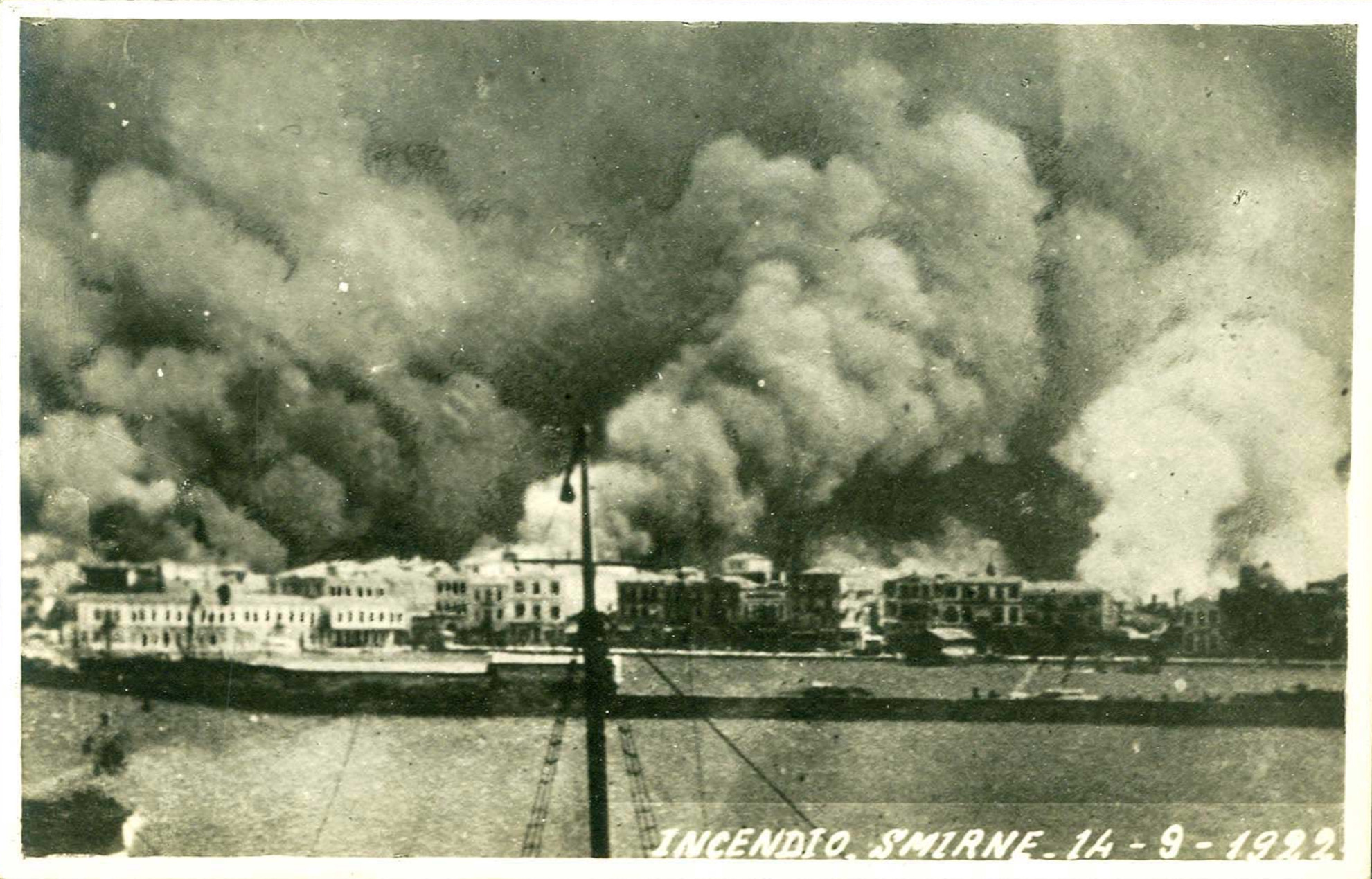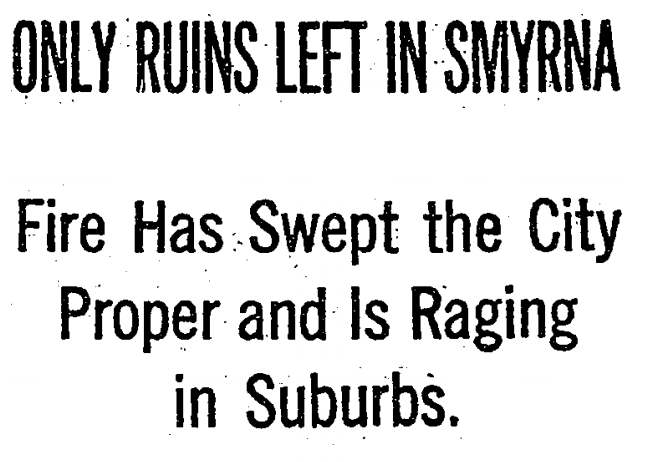|
Trial Of The Six
The Trial of the Six ( el, Δίκη των Έξι, ''Díki ton Éxi'') or the Execution of the Six was the trial for treason, in late 1922, of the Anti-Venizelist officials held responsible for the Greek military defeat in Asia Minor. The trial culminated in the death sentence and execution of six of the nine defendants. Background On September 9, 1922, Turkish military and guerilla forces entered the city of Smyrna (now İzmir), in Asia Minor, which was previously occupied by Greece by the Treaty of Sèvres. Hundreds of thousands of Greek residents from Asia Minor fled to Smyrna seeking transportation across the sea to escape the advancing Turks. The pro-royalist government in Athens lost control of the situation and could only watch as the events unfolded. The retreating Greek "Army of the East" abandoned Smyrna on September 8, the day before the Turkish Army moved in. Transportation arrived late and in too small numbers relative to the number of people trying to flee, resu ... [...More Info...] [...Related Items...] OR: [Wikipedia] [Google] [Baidu] |
Great Fire Of Smyrna
The burning of Smyrna ( el, Καταστροφή της Σμύρνης, "Smyrna Catastrophe"; tr, 1922 İzmir Yangını, "1922 Izmir Fire"; hy, Զմիւռնիոյ Մեծ Հրդեհ, ''Zmyuṙno Mets Hrdeh'') destroyed much of the port city of Smyrna (modern İzmir, Turkey) in September 1922. Eyewitness reports state that the fire began on 13 September 1922Horton, George. '' The Blight of Asia''. Indianapolis: The Bobbs-Merrill Company, 1926; repr. London: Gomidas Institute, 2003, p. 96. and lasted until it was largely extinguished on 22 September. It began four days after the Turkish military captured the city on 9 September, effectively ending the Greco-Turkish War, more than three years after the landing of Greek army troops at Smyrna on 15 May 1919. Estimated Greek and Armenian deaths resulting from the fire range from 10,000 to 125,000.Naimark, ''Fires of Hatred'', p. 52. Approximately 80,000 to 400,000 Greek and Armenian refugees crammed the waterfront to escape from the ... [...More Info...] [...Related Items...] OR: [Wikipedia] [Google] [Baidu] |
Alexandros Othonaios
Alexandros Othonaios ( el, Αλέξανδρος Οθωναίος, Gytheio, 1879 – Athens, 20 September 1970) was a distinguished Greek general, who became briefly the acting Prime Minister of Greece, heading an emergency government during an abortive coup in 1933. Early life and career Othonaios was born at Gytheion in 1879, and enrolled in the Hellenic Military Academy. He participated in the Macedonian Struggle with the ''nom de guerre'' of ''Kapetan'' Palamidis, and was a member of the Military League. He fought in the Balkan Wars, and sided with Eleftherios Venizelos during the National Schism, commanding the 7th Cretan Regiment in the Macedonian front of World War I. He also took part in the Allied intervention in the Russian Civil War in 1919 with the rank of Colonel. Subsequently, he was appointed Commanding Officer of the Kydoniai Division and participated in the occupation of the Smyrna district in the early stages of the Asia Minor Campaign. After the electoral defe ... [...More Info...] [...Related Items...] OR: [Wikipedia] [Google] [Baidu] |
Michail Goudas
Michael may refer to: People * Michael (given name), a given name * Michael (surname), including a list of people with the surname Michael Given name "Michael" * Michael (archangel), ''first'' of God's archangels in the Jewish, Christian and Islamic religions * Michael (bishop elect), English 13th-century Bishop of Hereford elect * Michael (Khoroshy) (1885–1977), cleric of the Ukrainian Orthodox Church of Canada * Michael Donnellan (1915–1985), Irish-born London fashion designer, often referred to simply as "Michael" * Michael (footballer, born 1982), Brazilian footballer * Michael (footballer, born 1983), Brazilian footballer * Michael (footballer, born 1993), Brazilian footballer * Michael (footballer, born February 1996), Brazilian footballer * Michael (footballer, born March 1996), Brazilian footballer * Michael (footballer, born 1999), Brazilian footballer Rulers =Byzantine emperors= *Michael I Rangabe (d. 844), married the daughter of Emperor Nikephoros I *Mic ... [...More Info...] [...Related Items...] OR: [Wikipedia] [Google] [Baidu] |
Allies Of World War I
The Allies of World War I, Entente Powers, or Allied Powers were a coalition of countries led by France, the United Kingdom, Russia, Italy, Japan, and the United States against the Central Powers of Germany, Austria-Hungary, the Ottoman Empire, Bulgaria, and their colonies during the First World War (1914–1918). By the end of the first decade of the 20th century, the major European powers were divided between the Triple Entente and the Triple Alliance. The Triple Entente was made up of France, Britain, and Russia. The Triple Alliance was originally composed of Germany, Austria–Hungary, and Italy, but Italy remained neutral in 1914. As the war progressed, each coalition added new members. Japan joined the Entente in 1914 and after proclaiming its neutrality at the beginning of the war, Italy also joined the Entente in 1915. The term "Allies" became more widely used than "Entente", although France, Britain, Russia, and Italy were also referred to as the Quadruple Entente ... [...More Info...] [...Related Items...] OR: [Wikipedia] [Google] [Baidu] |
High Treason
Treason is the crime of attacking a state authority to which one owes allegiance. This typically includes acts such as participating in a war against one's native country, attempting to overthrow its government, spying on its military, its diplomats, or its secret services for a hostile and foreign power, or attempting to kill its head of state. A person who commits treason is known in law as a traitor. Historically, in common law countries, treason also covered the murder of specific social superiors, such as the murder of a husband by his wife or that of a master by his servant. Treason (i.e. disloyalty) against one's monarch was known as ''high treason'' and treason against a lesser superior was ''petty treason''. As jurisdictions around the world abolished petty treason, "treason" came to refer to what was historically known as high treason. At times, the term ''traitor'' has been used as a political epithet, regardless of any verifiable treasonable action. In a civil war or ... [...More Info...] [...Related Items...] OR: [Wikipedia] [Google] [Baidu] |
Georgios Hatzianestis
Georgios Hatzianestis ( el, Γεώργιος Χατζηανέστης, 3 December 1863 – 28 November 1922) was a Greek artillery and general staff officer who rose to the rank of lieutenant general. He is best known as the commander-in-chief of the Army of Asia Minor at the time of the Turkish August 1922 offensive, which he failed to stop. Relieved, he was later tried and condemned in the Trial of the Six as one of the main culprits of the Greek defeat in the Asia Minor Campaign, and executed. Life Hatzianestis was born in Athens on 3 December 1863. His father was Nikolaos Hatzianestis, the Prefect of Attica and Boeotia, and his mother was Maria Pitsipios, daughter of the scholar Iakovos Pitsipios. He graduated from the Hellenic Military Academy as a second lieutenant in the Artillery on 25 July 1884 and continued his military studies in Imperial Germany. After a period of service in the newly founded Hellenic Military Geographical Service, he served in the Greco-Turkish ... [...More Info...] [...Related Items...] OR: [Wikipedia] [Google] [Baidu] |
Petros Protopapadakis
Petros Protopapadakis ( el, Πέτρος Πρωτοπαπαδάκης; 1854–1922) was a Greek politician and Prime Minister of Greece in May–September 1922. Life and work Born in 1854 in Apeiranthos, Naxos, Protopapadakis studied mathematics and engineering in Paris but was keenly interested in politics. He was a professor at the Scholi Evelpidon, the military academy of Greece. Protopadakis was elected to the Hellenic Parliament in 1902 as a member of the conservative Nationalist Party. He later joined the People's Party and served as Minister of Economy and later, in the government of Dimitrios Gounaris, he was the Justice Minister (1921–22). In 1922, during the ill-fated Greco-Turkish War, Protopapadakis was asked to form a government by King Constantine when Gounaris resigned after almost losing a vote of confidence. Protopapadakis became Prime Minister and Gounaris the Justice Minister, and remained so for a little more than 3 months and was overthrown by a m ... [...More Info...] [...Related Items...] OR: [Wikipedia] [Google] [Baidu] |
Nikolaos Stratos
Nikolaos Stratos ( el, Νικόλαος Στράτος; 16 May 1872 – 28 November 1922 (15 November Old Style dating)) was a Prime Minister of Greece for a few days in May 1922. He was later tried and executed for his role in the Catastrophe of 1922. Early political career Born in 1872 in Loutro, Aetolia-Acarnania, Stratos was first elected to Parliament in 1902. He was chosen as Interior Minister in 1909 under Kiriakoulis Mavromichalis after the Military League took power. In 1910 he joined the Liberal party of Venizelos and in 1911 he was elected President of the Parliament. However, during the National Schism, he disagreed with the liberals and sided with King Constantine. In 1916 he founded the "National Conservative Party" and advocated neutrality during the World War. Prime minister In 1922, Greece was in turmoil as the war in Asia Minor was in a stalemate after the failure of the Greek attempt to capture Ankara the previous year. When Prime Minister Dimitrios Gouna ... [...More Info...] [...Related Items...] OR: [Wikipedia] [Google] [Baidu] |
Dimitrios Gounaris
Dimitrios Gounaris (; 5 January 1867 – 28 November 1922) was a Greek politician who served as the Prime Minister of Greece from 25 February to 10 August 1915 and 26 March 1921 to 3 May 1922. Leader of the People's Party (Greece), People's Party, he was the main right-wing politics, right-wing opponent of his contemporary Eleftherios Venizelos. Early life He studied law at Athens University and continued his studies in Germany, France and England, before returning to his native Patras. He was elected deputy for Achaea in 1902 and distinguished himself as an orator and a member of the so-called "Japanese Group" that opposed the Georgios Theotokis government in 1906–1908. Gounaris himself, however, joined the government in 1908 as Finance Minister, hoping to implement a reformist program, thereby causing the dissolution of the group, although he was soon forced to resign. Despite his progressive views (he was an admirer of the Otto von Bismarck, Bismarckian German social laws ... [...More Info...] [...Related Items...] OR: [Wikipedia] [Google] [Baidu] |





_Stratos.jpg)
